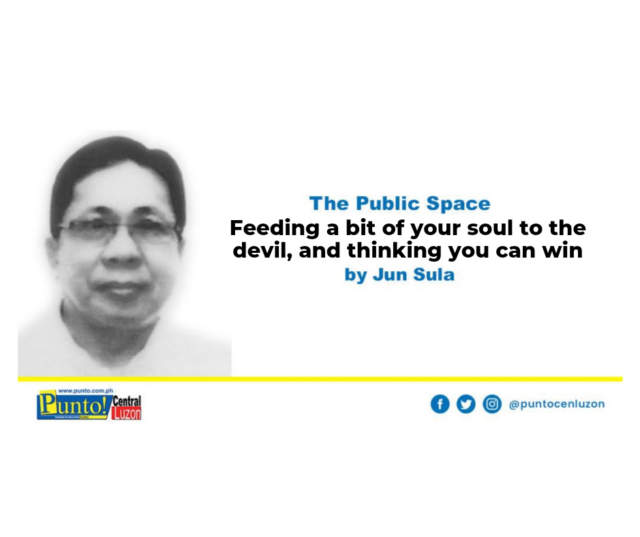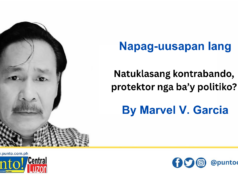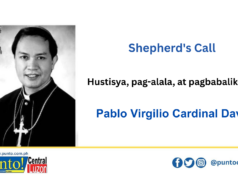MOST FILIPINOS, according to survey, don’t see any problem taking bribe money from candidates of any political color — then figuratively run — and still vote the one dictated by their conscience. The survey, however, doesn’t – and probably can’t— say, for sure, whether that’s what really is the case.
This proposition – reality, as one prominent presidential candidate puts it—suggests two things: One, politics is practical business. Why swim against the current when you can frolic in the flow of it? The other is, it confirms what has been said for the longest time: there is no morality in politics.
The Irish author Oscar Wilde long ago suggested that the best way to fight temptation is to yield to it. That the same advice people get from those who believe it’s alright to be bribed.
There’s a law that, try as might, imposes a certain morality into this obnoxious transaction every elections season between the voters and the candidates. The Omnibus Election Code is clear: it is unlawful to buy or sell votes, regardless of the kind and value of exchange. Commodification of one’s vote is illegal, and therefore, immoral. Forget about the philosophical and religious hair-splitters.
Even non-candidates can be liable if they give or promise to give voters anything of value, whether it’s P5.00 or P5,000 or something in kind in exchange for their votes in a positive or negative way. It’s positive, if they vote for a certain candidate or negative if they will not vote for another candidate — in fact, if they don’t vote at all as a condition.
In sum, vote buying or vote selling is a crime, an election crime that is punishable by imprisonment.
Yet, and yet, it is conceded the most violated election rule in the Philippines. In fact, this illegal practice has created a systemic culture of expectation between the candidates and the electorate. It’s all of a piece with what former Sen. Rene Saguisag lamented that this our land is a nation of scofflaws, in addition to his perennial discomfort that Filipinos multiply like rabbits.
Those who should know better, add injury to insult by endorsing the ‘crime’ as it were. Seen in the light of the pandemic and the massive hardship that it has brought upon many people, it seems like common sense today. Any well-meaning advice or warning to contrary might seem like counterintuitive. So the best of candidates, and the most popular religious leaders, condone it. One common rationale: it’s the taxpayers’ money anyway, so it’s just right to take it back. There you go, Robin Hood.
In an imperfect environment that is uniquely Pinoy, this is the reality. And Filipino voters must live with it, like the rich young ruler in the Bible, to have fun and be merry for tomorrow is another uncertain day. Besides, they are entitled to it,
The other side of the issue is that those who are supposed to enforce the law and punish the violators have yet to show up. The breaching is so widespread and willful, they must have been overwhelmed by it ,and decided the law must be unenforceable, especially when in the evil equation are many who are called or call themselves lawmakers. It’s a devil’s game, no doubt.
The presidential aspirant who has urged voters to take the money and run, figuratively, is encouraging people to break the law. It’s more than politicking that those from the camps of other presidential wannabes are hollering disqualification. It isn’t likely to happen, though.
What is likely to happen is that voters will go their merry way of selling their votes, and it’s not exactly at the buyer’s price, and live another day. Voters have learned their way and like merchants, they go for the higher, if not, highest bid. As to their conscience, that’s another matter. At the rate votes are being offered like red meat, with the price trending like it is following the law of supply and demand, it looks like conscience is relegated to the sideline. Or, conscience is ultimately influenced by the value of the exchange. When a priest and a lawyer tells you it’s okay to break the law if it helps pay the bills, then that conscience is overruled or reinforced in the wrong way.
Granting, in the end the voters take Thomas Aquinas admonition that he who goes against his conscience sins, then the voters who take the money and vote upon the dictate of the conscience, become a confused lot. How can one break the law and claims his or her conscience is clear? Virtue is better than vice, Adam Smith said, because its excesses are not regulated by conscience. Yet, there are people who should know better and blithely defy it.
There is an old Kapampangan adage that warns against such cavalier manner of treating vice. Silong malambot, it says, matalik a igut. (A soft noose with a tight pull). Falling for money or its equivalent value in exchange for one’s vote is selling one’s birthright for a bowl of porridge, the infamous Jacob-Esau trade off. It can tide you over for a short time but, in the exchange, you put to great risk your long-term welfare, and relationship. That’s how skepticism morphs into cynicism. The issue is no longer who is corrupt among the wannabes, but who’s more. How long have we been in this slippery slope? That’s the forgotten, essential question.
It’s a Faustian bargain, this vote-buying and vote-selling transaction, and only the devil is happy about it. “What doth a profit man if he gains the whole world but loses one soul?”, the Scriptures warn.
“I have two souls,” Faustus said, who had a pact with the devil at the expense of his soul “and the two are irreconcilable”. It is the choice between right and wrong, two absolutes, that falls upon men, according to E.A. Buchianneri.
Sadly, politicians, and some high priests, tell us to take the easy, convenient, dubious, selfish choice.





